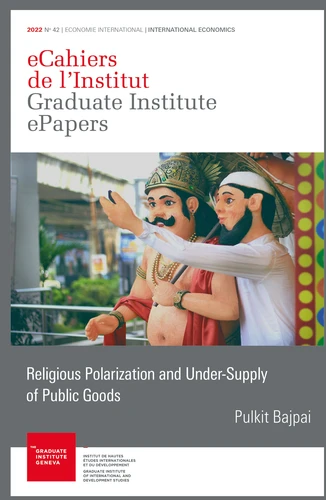Religious Polarization and Under-Supply of Public Goods
Par :Formats :
Disponible dans votre compte client Decitre ou Furet du Nord dès validation de votre commande. Le format Multi-format est :
- Pour les liseuses autres que Vivlio, vous devez utiliser le logiciel Adobe Digital Edition. Non compatible avec la lecture sur les liseuses Kindle, Remarkable et Sony
 , qui est-ce ?
, qui est-ce ?Notre partenaire de plateforme de lecture numérique où vous retrouverez l'ensemble de vos ebooks gratuitement
Pour en savoir plus sur nos ebooks, consultez notre aide en ligne ici
- FormatMulti-format
- ISBN978-2-940600-37-3
- EAN9782940600373
- Date de parution14/01/2022
- Protection num.NC
- Infos supplémentairesMulti-format incluant PDF avec W...
- ÉditeurGraduate Institute Publications
Résumé
Social heterogeneity results in a lower supply of public goods because of the conflict, diverse preferences and political insecurity that predominate in socially heterogeneous contexts. Despite its multiple stratifications along religious, caste and linguistic lines, India has scarce academic research on the impact of social heterogeneityon economic outcomes. I study the impact of religious polarization, measured through religious heterogeneity, on the supply of public goods at the sub-district level in India.
I use anovel fixed effects panel and spatial data approach to establish this relationship and find a significant negative impact of religious polarization on public goods provision. We extend our heartfelt thanks to the Vahabzadeh Foundation for financially supporting the publication of best works by young researchers of the Graduate Institute, giving a priority to those who have been awarded academic prizes for their master's dissertations.
I use anovel fixed effects panel and spatial data approach to establish this relationship and find a significant negative impact of religious polarization on public goods provision. We extend our heartfelt thanks to the Vahabzadeh Foundation for financially supporting the publication of best works by young researchers of the Graduate Institute, giving a priority to those who have been awarded academic prizes for their master's dissertations.
Social heterogeneity results in a lower supply of public goods because of the conflict, diverse preferences and political insecurity that predominate in socially heterogeneous contexts. Despite its multiple stratifications along religious, caste and linguistic lines, India has scarce academic research on the impact of social heterogeneityon economic outcomes. I study the impact of religious polarization, measured through religious heterogeneity, on the supply of public goods at the sub-district level in India.
I use anovel fixed effects panel and spatial data approach to establish this relationship and find a significant negative impact of religious polarization on public goods provision. We extend our heartfelt thanks to the Vahabzadeh Foundation for financially supporting the publication of best works by young researchers of the Graduate Institute, giving a priority to those who have been awarded academic prizes for their master's dissertations.
I use anovel fixed effects panel and spatial data approach to establish this relationship and find a significant negative impact of religious polarization on public goods provision. We extend our heartfelt thanks to the Vahabzadeh Foundation for financially supporting the publication of best works by young researchers of the Graduate Institute, giving a priority to those who have been awarded academic prizes for their master's dissertations.



